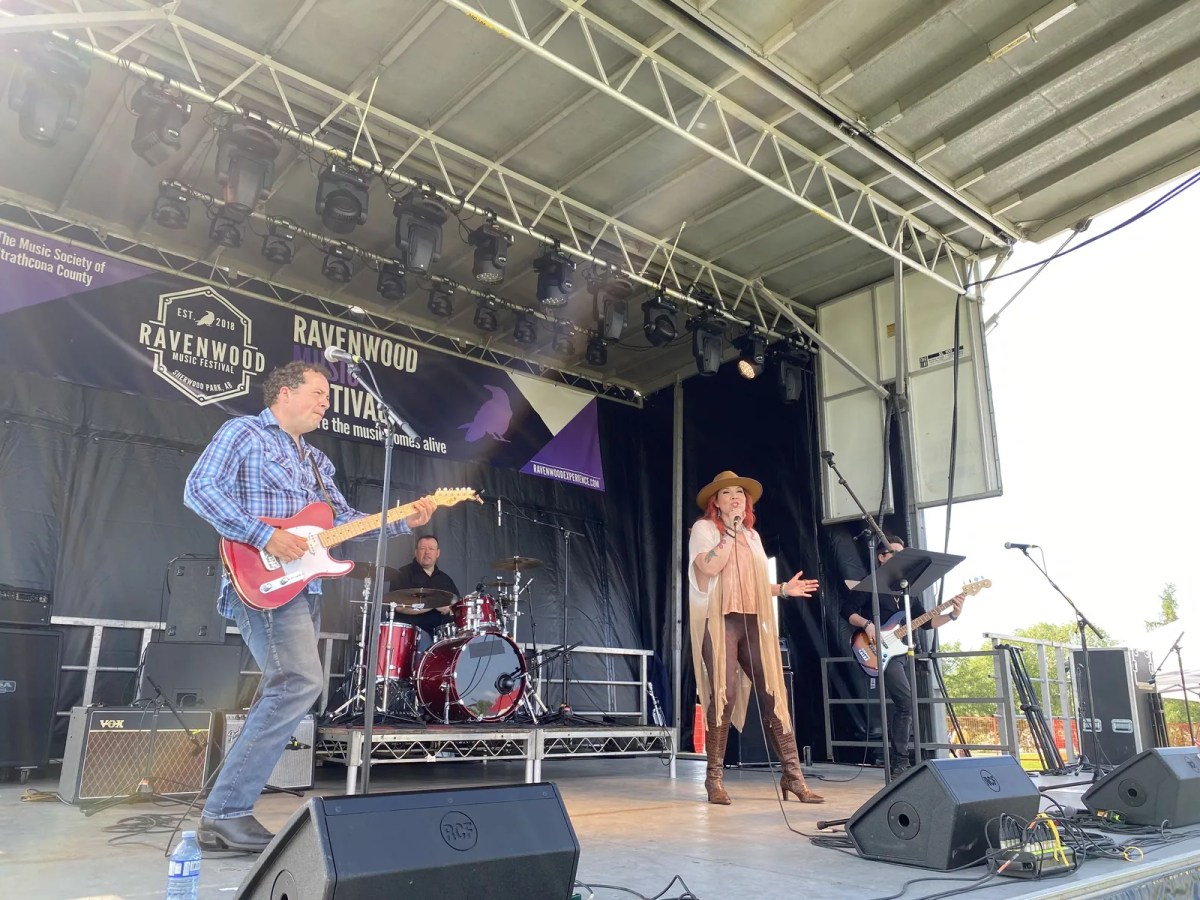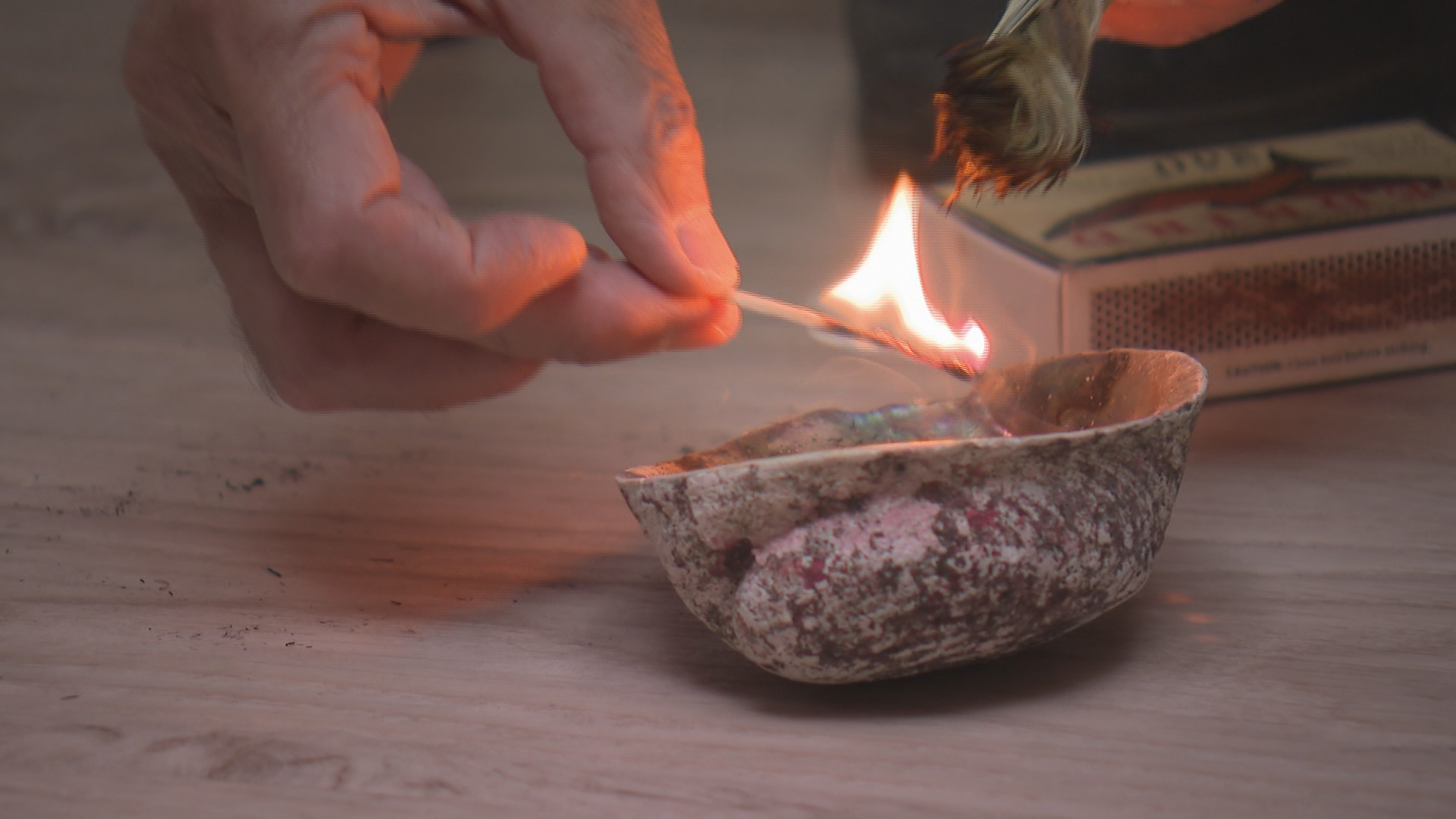This is the third story in a Global News series called Journey Towards Reconciliation. To see previous stories, click here.

Alberta singer-songwriter Donita Large has leaned on music as a way to heal for most of her life.
When she was a child, she was taught to pray and sing loudly by her grandmother, or Kokom, on her mother’s side from Kehewin.
Large attended the Catholic Church on Saddle Lake First Nation with her father, a residential school survivor.
“Growing up, all I knew was that, yes, my dad went to residential school,” she said.
“But I didn’t understand the intergenerational effects.”
Experts and First Nations advocates have cited the violence and abuse inflicted upon several generations of Indigenous children at the schools as the reason why Indigenous communities experience disproportionately higher rates of violence, psychological distress and substance use and abuse.
Large said what her father went through impacted his ability to parent her when she was young.
“I moved out when I was 16,” she said. “At that time, he didn’t know how to parent, like many people (who) went to residential school. They weren’t parented.”
Large said her past empowered her to help others and teach groups about intergenerational trauma.
She’s rekindled a relationship with her father after he too learned about his own past, and how to move forward.
“I’m so grateful so many of my family went through healing, went through recovery and can openly talk and teach because I know that doesn’t exist for everybody.”
After going through that recovery, her dad spent years working to help others in his community understand their own experiences and heal.
In Large’s research into her own history, she also uncovered links to her past that her father didn’t know about.
He had two siblings that attended the same residential school as he did. They both died and his mother never talked about them.
“I can’t imagine, as a mother, knowing that you already lost two children and then you’re still sending two more,” Large said.
“My dad had a brother as well that also still had to go to residential school, and that there was no choice.”

Get daily National news
After the discovery of more than 200 suspected unmarked graves at a former residential school site in Kamloops, B.C, Large said it really hit home for her how little Canadians understood about the impact of these institutions.
She said she was surprised by the number of co-workers who approached her, and their emotions around the subject.
“They were the ones that weren’t OK,” Large said. “The stories that they had been hearing were just stories. It took the bones of our children for them to see that this had happened.”
She went home and was inspired to write. It was the beginning of the song “Reconciliation Sky,” a powerful homage to those children in her community who had been lost, and the work that needs to be done in the relationship between Canadians and Indigenous communities.
“It was just my way of being able to process everything I was feeling.”
Music has been used in ceremony of Indigenous people for thousands of years.
At Maskwacis Counselling and Support Services, Peyasu Wuttunee and his team are using cultural healing practices to help address issues in their community.
They hold sweat lodge sessions and use pipe and smudge ceremonies to bring back the past, to help others move forward.
Wuttunee was a part of the mental health support team in Maskwacis during Pope Francis’ visit there during the summer of 2022, and continues to offer those supports for residential school survivors and their families.

“We’ve had an increase in our cases,” Wuttunee told Global News as part of the television special Journey Towards Reconciliation.
He said Maskwacis Counselling and Support Services hosted three different sharing circles after the pope’s visit, but they weren’t well attended.
“What that told me was that people weren’t open to sharing how they felt,” Wuttunee said. “Our challenge, as a service provider, is how do we meet those needs when those emotions come — and they do come and they have.
“However people responded, it was welcome — anger, sadness, joy — all of it was welcome.”
Wuttunee works with a team including Garry Louis, who offers cultural support along with mental health supports. He said cultural ceremony is the most important part of healing.
Reflecting on the visit of Pope Francis, he said he watched as people who didn’t want to see the apology changed from bitter and angry to starting to talk about what they went through.
“It doesn’t have to be a whole lot of people,” Louis said. “As long as we get a few people getting better treatment. It is taking that first step.”
“I’ve seen people come in to a ceremony because of what they went through in residential school,” Louis added.
“I always try to have them put it into perspective and say, ‘What did we have before, before the white men got in here, before the religion got here? We had native spirituality.’
“If we were all to follow all those teachings, our elders, our past elders, of tolerance and the songs and the ceremonies, I think we would be a far more resilient people.”
There have been obstacles for the organization, in gaining the trust of clients to open up about their struggles.
“It goes back to colonialism and residential school and the policies of the government of Canada that broke those systems and community that were strong and had been for a millennium,” said Wuttunee. “It didn’t happen overnight. And it’s not going to be repaired overnight.
“That trust is just part of the healing journey, rebuilding it.”
Wuttunee said each person’s journey to reconciliation is unique.
Lorne Greene, a residential school survivor and counsellor at Maskwacis Counselling and Support Services, takes his own experiences to help others in his community.
“Our culture is strong and there’s a resurgence, people are going back to the culture,” Greene said. “We need to reconcile with ourselves and with our loved ones.
“That’s what’s going to move us forward.”
Greene adds although it is important to move forward, it is also important to remember what happened in the past.
“These hurts are still with us today,” he said. “They’ve been handed down through the generations.”
Large agrees. She said this is an ongoing issue.
“We need space to be able to talk about what’s real for each of us,” she said, adding the first step towards healing is acknowledging the truth in what happened.
“To be able to acknowledge the truth allows us to heal from the truth and it takes away the shame,” she said.
“If we just bypass it and try to jump to reconciliation, we’re not really moving anywhere. We’re just trying to move past it as if it didn’t happen.”

The Indian Residential Schools Resolution Health Support Program has a hotline to help residential school survivors and their relatives suffering trauma invoked by the recall of past abuse. The number is 1-866-925-4419.








Comments
Want to discuss? Please read our Commenting Policy first.